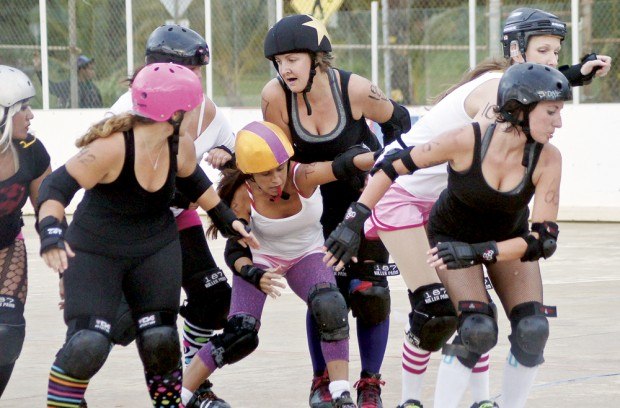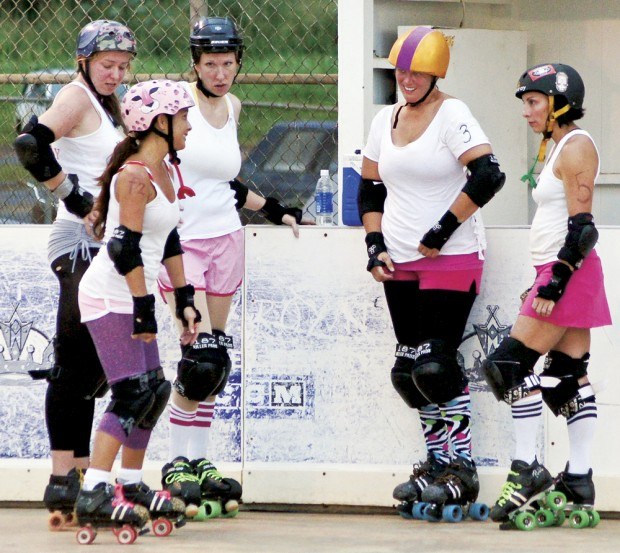KAPA‘A — Wearing torn fishnet stockings, cinched tank tops, miniskirts and shorts, about 15 women of the Garden Island Renegade Rollerz — G.I.R.R. — ready themselves for their weekly practice.
But make no mistake, these women aren’t here to make a fashion statement. They’re here to skate.
As the scrimmage begins, the skaters quickly turn their practice at the Kapa‘a in-line hockey rink into a coordinated ballet. Five women from each team dance around each other as they leap, slide and glide around a long, oval-shaped track.
In the stands, people let out groans and wince in their seats as they watch skaters engage in violent theatrics. Women are shoved out of bounds, and others take a hard spill on the unforgiving track.
But the women don’t let their tumbles take them out of the action. This is roller derby, after all.
“When I tell people I play roller derby, a lot of people ask, ‘Are you beating girls on cement?,’” said Mele Khalsa, who goes by the nickname Maelstrom in the rink. “But it’s not how it is. There are rules and structure. You can’t throw punches. You can’t tackle people. It’s a very friendly game.”
Make no mistake, roller derby is a full-body contact sport. But the skaters on the track see that as part of its allure.
“It’s a unique sport,” said Anaik Martin, aka Pussy Go Score. “You can be the nicest person off the track, and then on the track a different person comes out. I’m very laid back and I’m not an aggressive person by nature, but I’m very competitive.”
Other skaters have played contact sports such as rugby and ice hockey, while one practiced martial arts for 10 years.
But don’t think you have to be a warrior woman to join the team.
“Roller derby embraces everybody,” said Jen Vaughn who joined G.I.R.R. in 2010. “No matter what your body type, if you are big or small, there’s a place for you. We are open to everyone. We embrace people from all walks of life.”
Skaters in the league are mothers, teachers, business owners, scientists, technicians and physical therapists.
“It’s a great opportunity for women to find how exciting it is to play a sport,” Martin said. “The Garden Island Renegade Rollerz were formed by women who wanted to get all kinds of women together. This is the first sport in the world created by women, for women.”
History
Roller derby was born in the mid-1930s, when teams of professional skaters — men and women — raced around a banked track. The sport found a resurgence in the 1970s, but its popularity dropped in the 1980s.
The sport resurfaced again in 2000 as an amateur, women-only sport. Participants began wearing skimpy outfits and donning stage names, adding an alternative edge to the sport.
In 2009, the G.I.R.R. formed and established itself as a nonprofit organization with a mission to “promote a positive attitude with a focus on female empowerment and strive to remain a positive influence in our communities.”
For both, the new and seasoned skaters of G.I.R.R., they enjoy a shared sense of camaraderie.
“I like the camaraderie,” said Fawn Perry, aka Sancho Pounzya, who joined the league last June. “Everyone is good support for each other. I always heard people talking about roller derby, and I watched the bouts. At first I thought it might be silly, but it’s an intense sport and way fun.”
When Perry first donned her pair of quad skates, she didn’t let the fact that she hadn’t skated since she was 9 years old get in her way.
“When I first put on skates, I couldn’t even leave the wall,” said Perry. “I told myself, ‘I know I’m going to fall,’ and I accepted it. It’s not how many times you fall, it’s how many times you get back up.”
Mandi Swanson did not think she was ready, either.
“It’s a lot of fun, the girls are great,” said Swanson, aka Chilly Pepper. “I think anybody could do it. In fact, I can’t think of anyone who can’t do it. I’m 41 years old. I thought maybe I’m a little too old to do this, but we are all on the same level.”
Misconceptions
In a game where skaters assume the role of bumper cars, it’s surprising to see the emphasis the group places on helping each other and their sense of family.
“It’s been so awesome,” said Khalsa, who is in the midst of completing a newbie clinic. “Everyone is so friendly. I always get tips on how to improve my skating. It’s very sisterly.”
The organization also hosts a junior derby for young skaters ages 5 to 17, aptly named the GIRRANIMALS. The league offers a safe, fun and positive environment for children to learn how to skate, the older skaters said.
“One of our goals is to get more kids involved,” Vaughn said.
Martin, who is a mother of two, enrolled her 8-year-old daughter in GIRRANIMALS.
“We don’t do full contact roller derby,” Martin said. “During practice, we work on roller core skills and strengthening the body. The simplest skills make you really good. That is what we do with the kids.”
‘We are not violent people’
While the aggressive nature of the game might give the sport a negative light, G.I.R.R. takes measures to protect its athletes.
“We are not violent people,” Vaughn said. “We are not aggressive people. We do fall and hit each other, but there are a lot of rules in place.”
Forty-seven pages of rules in place, to be exact, which describe how to have a safe bout, or match.
Knee and elbow pads, helmets, wrist guards and mouth guards are required for safety. One of the first things a new skater learns is how to fall properly to minimize injury.
New skaters have to go through a training period and pass a series of written and physical skills tests before they are eligible to compete in bouts.
“It’s really just a lot of fun,” Swanson said. “You can get hurt, but we all stick up for each other. When you fall down, we encourage you to get back up.”
Vaughn said G.I.R.R. teaches skaters “everything they need to know” about the sport.
“We have people who never thought they were tough — people who never played sports in their life — skate with us,” Vaughn said.
A venue to call home
The skaters’ main priority is to find a venue they can call home. Currently, they hold practice twice a week at the Kapa‘a skate rink, or at less-forgiving community basketball courts and tennis courts where falls can result in bruises, road rash and other injuries.
“We are always keeping our eyes open for a venue,” Vaughn said.
With the recent rains that plagued the island earlier this month, the skaters had to postpone practices until the weather cleared.
“It’s been challenging for us,” Khalsa said. “I know there’s a place somewhere here for us.”
The skaters also want to recruit new skaters.
“If you are interested in doing it, don’t think you can’t,” Martin said. “Don’t cut yourself short. We always have new people. You’ll surprise yourself. I didn’t think I’d fall in love with the sport the way I did.”
Meet the skaters as they host a fundraiser at 7 p.m. Saturday at Port Allen Bar and Grill in ‘Ele‘ele.
Visit www.girenegaderollerz.com or the G.I.R.R. Facebook page for more information.
• Andrea Frainier, lifestyle writer, can be reached at 245-3681, ext. 257, or afrainier@ thegardenisland.com.



